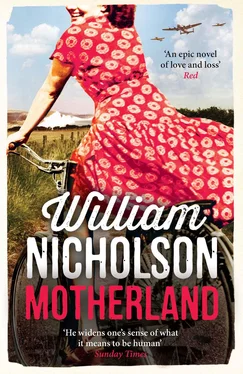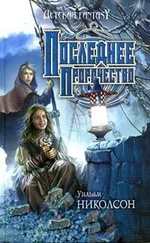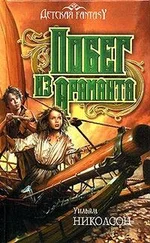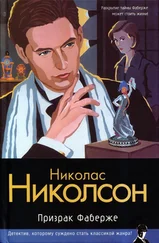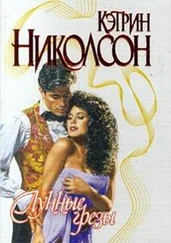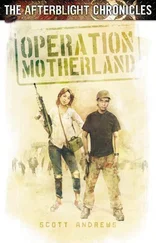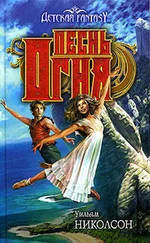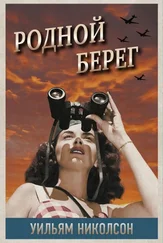On such a day before the war he would have tramped off alone up the Downs, carrying an easel and a fresh canvas, a box of paints and a picnic, and painted till dusk: precious empty days, few enough but intense in memory, when the world simplified before him to the play of light on form. Now like everyone else his time is filled with the tedium and pettiness of war. The cause may be great, but the life is diminished.
He leaves his bike in front of the house and goes through to the galleried hall. The first person he meets coming down the sweeping staircase, taking the steps two at a time, is Johnny Parrish.
‘We’re running late,’ says Parrish. ‘CO’s morning briefing’s now at 0830.’
‘Not like Woody to run late.’
‘Bobby Parks is joining us. He’s one of your lot, isn’t he?’
Parks is in Intelligence at Combined Ops. Larry has not been told he’s coming, but this is par for the course. Communication between the various branches of the organisation is erratic at best.
He checks his watch. He has a good fifteen minutes.
‘I’ll go and find the ATS drivers.’
‘Motor Transport Office in A Block. Who are you after?’
‘Corporal Kitty. I don’t know the rest of her name.’
‘Oh, Kitty.’ Parrish raises his bushy eyebrows. ‘We’re all after her.’
‘Just passing on a message for a friend.’
‘Well, you can tell your friend,’ says Parrish, ‘that Kitty has a boyfriend in the navy, and if, God forbid, her sailor buys it one day, an orderly queue will form at her door, and your friend can go to the end.’
‘Righto,’ says Larry cheerfully.
Captain Parrish goes into the dining room where breakfast is laid out for senior staff. Larry makes his way down the passage past the organ room to the garden door. Outside there’s a wide stone-paved terrace enclosed by a low stone balustrade. This terrace is raised above a second grass terrace, which in turn is raised above the extensive park. An avenue of lime trees crosses the park, leading to an ornamental lake. On either side of the avenue, laid out in grid formation between the lake and the house, lie row upon row of Nissen huts.
Larry pauses to admire the camp. The anonymous engineer who devised its plan has instinctively worked to counterpoise the neo-Gothic riot that is the big house. The camp is a modernist vision of order. Military discipline asserts control over the mess of life. What can be made straight is made straight.
He passes down the stone steps to camp level. A soldier heading for the ablutions huts gives him a grin and a wave. Larry is still new as liaison officer to the division, but the Royal Hamilton Light Infantry are a friendly crowd, and seem to have accepted him. Johnny Parrish calls him their ‘native guide’.
The door to the transport office stands open. Inside, two ATS girls are drinking tea in their shirtsleeves. One is stocky and red-faced. The other is tall and blonde, with a long face that might be called ‘horsey’.
Larry says, ‘I’m looking for Kitty.’
‘Who wants her?’ says the horsey girl.
‘Just delivering a message. Purely social. From a friend she met in the pub last night.’
‘The commando?’
‘Yes.’
The horsey girl’s manner changes. She throws a glance at the red-faced girl.
‘What did I say?’ Then to Larry, ‘She’s in the lake house.’
‘Thanks.’
He needs no directions to the lake house. It’s a shingle-roofed hexagonal wooden structure built out over the water, linked to the shore by a jetty. The jetty is roped off, and a sign on the rope reads: Out of bounds to all ranks .
He steps over the rope and crosses the jetty to tap softly on the closed door. Getting no answer, he opens the door. There, seated on the floor with a book resting in her lap, is a very pretty young woman in uniform.
‘Are you Kitty?’ he says.
‘For God’s sake shut the door,’ she says. ‘I’m hiding.’
He comes in and shuts the door.
‘Down,’ she says. ‘They can see you.’
He drops down to sit on the floor, below the level of the windows. All he has to do now is pass on his message and leave. Instead, he finds himself taking in every detail of this moment. The moving patterns on the walls thrown by sunlight reflected from the surface of the lake. The folds of her brown uniform jacket, discarded on the floor. The pebbled leather of her shoes. The way her body is curled, legs tucked beneath her and to one side. Her hand resting on the book.
The book is Middlemarch .
‘That’s a wonderful book.’
She looks at him in surprise. He realises that what has felt to him like a slow passage of time, within which he has come to know her well, has in reality been no more than a second or two, and he doesn’t know her at all.
‘Who told you I was here?’ she says.
‘The girls in the office.’
‘What do you want?’
‘I’m just passing on a message. You met a friend of mine in the pub, yesterday evening.’
‘The commando?’
‘He wants to ask you to lunch on Sunday.’
‘Oh.’ She wrinkles her brow. He watches her, but all he can think is how lovely she is. How he wants her to see him properly.
‘Do you like it?’ he says.
‘What?’
‘ Middlemarch .’
‘Yes,’ she says. ‘I didn’t at first.’
‘I suppose you find Dorothea a bit much.’
‘Excuse me,’ she says, ‘but who exactly are you?’
‘Larry Cornford. Liaison officer attached to Eighth Infantry.’
He holds out his hand. She shakes it, half-smiling at the formality. Smiling at the whole strange meeting.
‘What on earth is she doing marrying Mr Casaubon?’ she says. ‘Anyone can see it’s a really stupid idea.’
‘Well, of course it is,’ says Larry. ‘But she’s idealistic. She wants to do something noble and fine with her life.’
‘She’s a nincompoop,’ says Kitty.
‘Don’t you want to do something noble and fine with your life?’
He can’t help himself speaking as if they’re on intimate terms. It just feels that way to him.
‘Not particularly,’ she says.
But her sweet face, those big brown eyes exploring him, puzzling over him, tell him otherwise.
‘I don’t expect you’ll be an army driver for the rest of your life,’ he says.
‘Actually I love driving.’ And then, briskly, aware that this is heading into uncharted waters, ‘So what’s this lunch?’
‘Sunday. About twelve? The farm behind the church. It’s where I’m billeted. Ed says bring your friend too. The blonde one.’
He manages not to say the ‘horsey one’.
‘If it’s a farm, does that mean real food?’
‘Absolutely.’
‘Then we accept.’
‘Right. Message delivered.’ He rises. ‘I shall leave you with Dorothea.’
Striding briskly back across the camp to the big house, anxious not to be late for the CO’s morning meeting, Larry is aware of a new sensation. He feels light of body, light of heart. It seems to him that nothing really matters very much at all. Not his senior officers, not the war, not the turning of the whole great world. He tells himself it’s the morning sunshine after weeks of rain. He tells himself it’s no more than natural animal spirits inspired by the smile of a pretty girl. But he can still see that smile before him in his mind’s eye. She’s sharing with him the oddity that two strangers should be crouched on the floor of a lake house in wartime, discussing a nineteenth-century novel. She’s trying to make him out. That wrinkle between her eyebrows asks: what sort of person are you? Her smile so much more than a smile.
As is his habit, his mind reaches for comparisons in art. Renoir’s smudgy pink-cheeked girl reading a book, smiling to herself. But Kitty’s smile wasn’t private; nor was it provocative, like a hundred faux-innocent Venuses. She smiles to lay a courteous veil over an active curiosity. There’s a painting like it by Ingres, of Louise de Broglie, gazing, head a little tilted, one finger to her cheek, daring the viewer to know her.
Читать дальше
